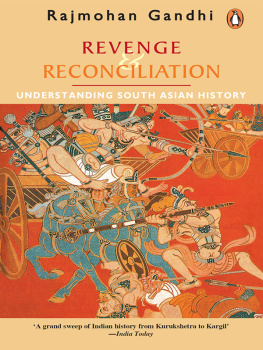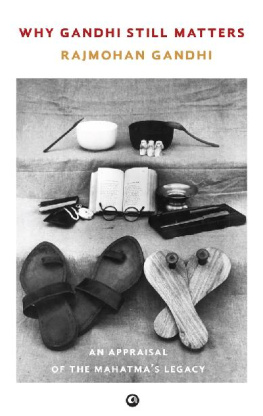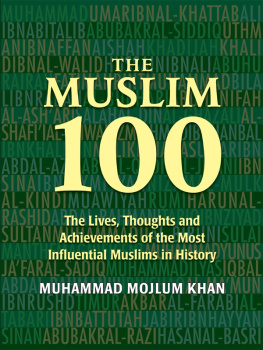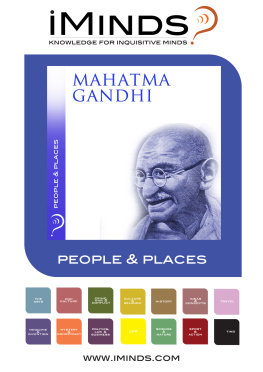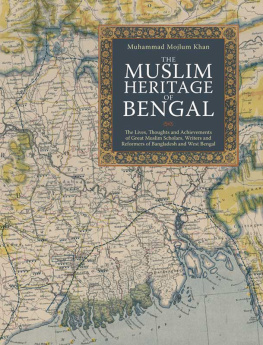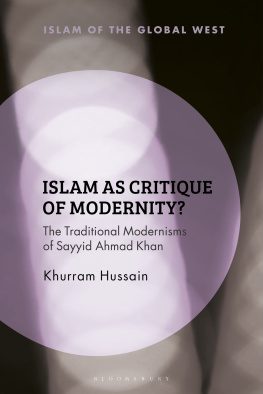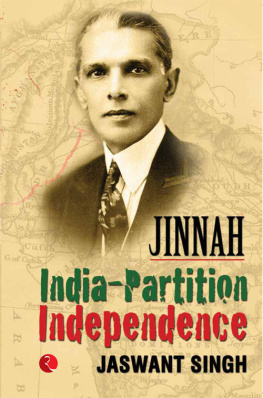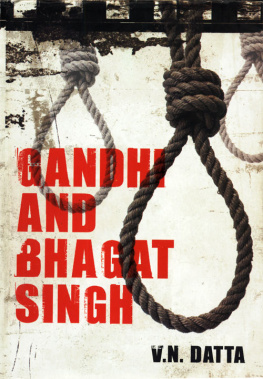Preface
W ritten in 198485 and published in the United States in 1986, Understanding the Muslim Mind was first brought out in India by Penguin Books in 1987. The public has been indulgent towards its reprints, and now the book appears in a new edition. I welcome the opportunity to write a fresh preface, particularly in light of the interest drawn by my study of South Asian history, Revenge and Reconciliation, which was published by Penguin at the end of 1999.
Tracing the South Asia story from the Mahabharata all the way to Kargil in 1999, and looking at a long chain of avengers as well as bridge-builders, Revenge and Reconciliation acknowledges at the end that the heterodoxy of reconciliation [has] not become a dominant Indian or South Asian trait. The final chapter, exploring strategies for reconciliation, underlines the need for listening with the heart as well as the ear, to what is said and also to what is unsaid.
It was a desire to listen in such a spirit to the other side that had led to Understanding the Muslim Mind. Having no idea how it was going to be received, I had mentally prepared myself to be told by Muslims that I had failed to enter their psyche, that it was presumptuous for a Hindu to try to do so; likewise I was ready for being labelled by some Hindus as the typical pseudo-secularist unwilling to acknowledge Muslim wrongs. In the event, however, some staunch Hindus, e.g., M.V. Kamath, gave the book a good grade, while a leading Pakistani intellectual Eqbal Ahmad, interviewed me on the book over Pakistan Television, and a Lahore publisher produced an Urdu edition, as I discovered when a traveller brought a copy. (Otherwise I might not have known of the Urdu edition.)
The opening line of my preface to Penguins first edition in 1987 read as follows: Any nuclear clash between India and Pakistan (may God forbid it) would in part be due to history. That theoretical spectre was certainly not banished by the blasts that came in the summer of 1998 in Pokharan and Chagai Hills, and subsequent events on the subcontinent have not made my 1987 prayer obsolete.
Of course, the Hindu-Muslim and India-Pakistan questions are two distinct things. As we in India are always quick to point out, Indias Muslims equal or outnumber Muslims residing in Pakistan. Also, Indias Muslims have regularly fought on Indias side in Indo-Pak battles. Yet the two questions are connected. After all, Pakistan was formed in 1947 partly because many Muslims wondered about their security in a Hindu-majority India free of the departing neutral power, Britain; and when there is an India-Pakistan cricket match, Indias Muslims can become conscious of eyes probing their inner sentiments.
Sane India-Pakistan relations and the welfare of India both require that Muslims understand the Hindu mind, and Hindus the Muslim mind. I hope that no one will infer from such a statement, or from the title of this book, that its author believes in a single or uniform Muslim (or Hindu) mind. The study is of a number of different minds and different lives, and I request the reader to interpret the title broadly.
As I write these lines in the spring of 2000, the subcontinents hates and suspicions seem to have leapt to an all-time high. It may be needed more than ever, but mutual understanding does not seem to be what mainstream Indians or Pakistanis, or Hindus and Muslims, are pining for. Yet I take a little heart from the fact that in South Asia the pendulum constantly swings. It was only thirteen months ago that Indians were stirred by Atal Behari Vajpayees bus trip to Lahore, and by his words in that pulsating metropolis:
I regret that we have spent so much time in mutual bitterness. It is unworthy of two nations the size of India and Pakistan to have wasted so much time in mutual ill will... As we approach a new millennium, the future demands upon us to think of the welfare of our children and their children... We have had enough of enmity, let us live in amity...
I was mindful of scholarships norms when I wrote Understanding the Muslim Mind and did not wish to sweep unpleasant facts under a carpet of unreal harmony. Yet I make no secret of my desire, as unqualified now as it was in 1987, for reconciliation between South Asias neighbouring communities and nations, even though the intervening years saw an intensification of Kashmir-related bitterness, the Babri demolition, the nuclear tests, the growth of the BJP and of Hindutva, the Kargil war, and the Musharraf coup.
* * *
Though the Muslim question pursued me from my childhood, I allowed a lot of time to pass before attempting a serious understanding of the subcontinents Muslims. Like many compatriots I mouthed the fact that India was the worlds second largest Muslim country but I had not cared to study the history of the subcontinents Muslims or the impulses that moved them.
I was ignorant but not, I recognized with some concern, more so than most of my non-Muslim compatriots, including highly educated ones. Thus, to give only two revealing examples, they did not know, as I had not known until I was more than forty, that the Quran contained a verse that unambiguously frowned upon compulsion in religion, or that it spoke more than once of God sending prophets to all nations and peoples. Muslims have been similarly uninformed about Hindu beliefs and points of views. Hence these pages, an attempt to reduce the understanding gap, or scale the separating wall.
History will not dissolve resentments and suspicions. Selective history will in fact harden them. Yet a frank and, as far as possible, non-partisan look at the past can at least tell us of blocks to Hindu-Muslim partnership and tell us, too, of what went wrong, and why, in the efforts to remove them. If we learn of times when the other side, too, was large-hearted, and of other times when our side also was small-minded, that awareness may make us, whoever we are, Hindus or Muslims, less prickly. History will then have served the cause of national, and subcontinental, understanding.
The Hindu-Muslim question can of course be addressed in several ways. I approach it here through the lives of eight Muslims who were prominent on the subcontinents stage in the hundred years following the 1857 rising. Some of these individuals were what conventional historiography in India calls communal. Others in the group of eight were nationalist.
Why these eight, and not any others? For one thing, I had chosen to probe the thoughts and reactions of those no longer living, a criterion that unfortunately eliminated one who is important to the story of modern South Asia, Khan Abdul Ghaffar Khan, who died in 1988, three years after the book was written.


